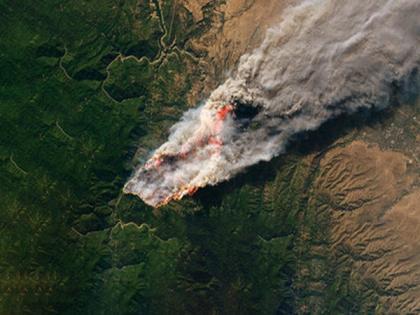Rise in forest fires is a permanence risk for global carbon markets
By ANI | Updated: November 17, 2022 16:05 IST2022-11-17T10:31:03+5:302022-11-17T16:05:02+5:30
Climate Connect Digital (CCD) has released a white paper quantifying the permanence risk posed by increasingly intense forest fires across the Indian subcontinent. This will potentially have a significant impact on nature-based carbon projects, and the voluntary carbon markets.

Rise in forest fires is a permanence risk for global carbon markets
(CCD) has released a white paper quantifying the permanence risk posed by increasingly intense forest fires across the Indian subcontinent. This will potentially have a significant impact on nature-based carbon projects, and the voluntary carbon markets.
To read more download the full white paper
Sharm-El Sheikh, Egypt (November 16, 2022)This year's United Nations Conference of Parties (COP 27) in Sharm El Sheikh, Egypt is in full swing, with countries gathered to decide on global action to combat climate change, with a sharp focus on fulfilling Article 6.
The CCD delegation visiting COP has released a white paper, detailing how carbon stocks in forests are being impacted by rising temperatures, and intensifying forest fires across the Indian subcontinental region. This gives concern for the future health of both natural ecosystems, and carbon markets. Current climate trends, and future projections are alarming, as the average temperature trend for the last 40 years has seen a rise of 0.5°C, leading to markedly increased weather volatility.
Projections out to 2100 for central India predict a significant increase in rainfall of 100 mm and rise in average temperature of 1.2°C. As such, the frequency, duration, and intensity of forest fires are also expected to be exacerbated.
These pose major risks for nature-based solutions (NBS) projects, and carbon project developers. In turn there will be a direct bearing on global carbon registries, which will have to manage the buffers required for mitigating the associated permanence risk.
Currently, around 20% of a project's carbon credits are set aside in a buffer by registries at the time of issuance, to mitigate the permanence risk. However, this level may be inadequate in the future, and have a knock-on effect on global markets.
The paper - titled Climate Change: Impact on Rainfall, Temperature and Forest Fires, an Indian Perspective - examines the past trends for central India from 1951 to 2020, and out to 2100. The study highlights the need for similar types of climate analysis to be conducted in other parts of the world.
Based on its findings, has started developing tools which enable near real-time monitoring of forest fires in areas of interest and generate actionable alerts.
(CCD) is a climate-tech company which has provided innovative technology and advisory solutions to the climate and clean energy domains for over 12 years.
A pioneer in applying AI to energy and climate tech, its solutions are deployed in various grids, and manage 12 GW of solar and wind power generation across more than 100 power plants.
With software solutions and expert consultants, CCD enables companies to build and implement strategies to achieve long-term emission reduction targets. Its software tools and expert advisory services also help carbon project developers to seamlessly achieve the maximum from their carbon assets.
To connect please write to us at
This story is provided by PRNewswire.will not be responsible in any way for the content of this article. (ANI/PRNewswire)
( With inputs from ANI )
Disclaimer: This post has been auto-published from an agency feed without any modifications to the text and has not been reviewed by an editor
Open in app